United States President Barack Obama and Chinese President Xi Jinping of China have signed a bilateral climate agreement.
Much of the US and British media, and many US Democrats, have hailed the deal as a key step forward. Many US Republicans have attacked it as going much too far.
Anything the Republicans attack has to be good. Right? No. In fact it is an appalling deal.
Let's look at the numbers.
-
-
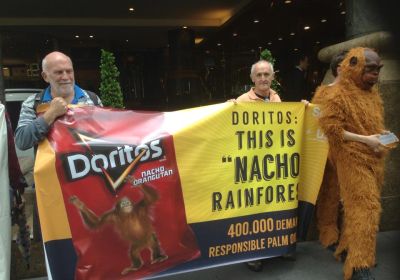 Sixty people, including activists from Papua New Guinea (PNG) and ABC radio presenter Julie McCrossin, protested outside the federal government's Asia-Pacific Rainforest Summit on November 12. The conference featured Liberal MPs Julie Bishop and Greg Hunt speaking to government ministers from the Asia Pacific region.
Sixty people, including activists from Papua New Guinea (PNG) and ABC radio presenter Julie McCrossin, protested outside the federal government's Asia-Pacific Rainforest Summit on November 12. The conference featured Liberal MPs Julie Bishop and Greg Hunt speaking to government ministers from the Asia Pacific region. -
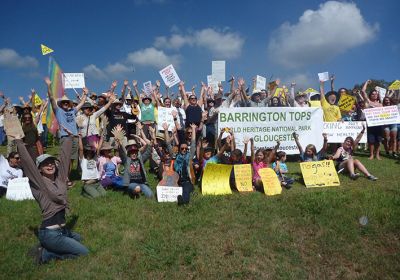 More than 200 people marched through Gloucester on November 8 to protest against AGL’s bid to drill for coal seam gas (CSG). Bernadette Smith joined a contingent from Sydney and reports from the blockade campsite. *** Over November 7 to 9, I camped with the Gloucester Protectors as part of a Sydney support contingent. Arriving on Friday afternoon we were met at the train station by a Gloucester Protector and taken to the Gloucester Protection Camp, only a five-minute drive away.
More than 200 people marched through Gloucester on November 8 to protest against AGL’s bid to drill for coal seam gas (CSG). Bernadette Smith joined a contingent from Sydney and reports from the blockade campsite. *** Over November 7 to 9, I camped with the Gloucester Protectors as part of a Sydney support contingent. Arriving on Friday afternoon we were met at the train station by a Gloucester Protector and taken to the Gloucester Protection Camp, only a five-minute drive away. -
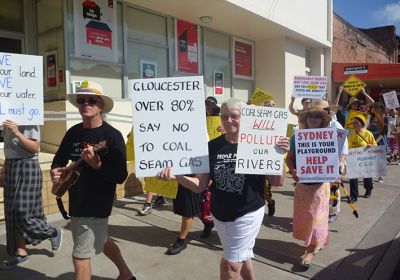 Nineteen demonstrators have been arrested since October 21 in protests against the recent approval of hydraulic fracturing (fracking) in Gloucester Valley, New South Wales. Police figures obtained by Green Left Weekly said charges range from trepassing, to individuals locking on to machinery or the buses transporting workers to the site. Fracking is the controversial process of extracting gas from underground coal seams and shale deposits by using high pressure to inject it with a chemical-water mixture.
Nineteen demonstrators have been arrested since October 21 in protests against the recent approval of hydraulic fracturing (fracking) in Gloucester Valley, New South Wales. Police figures obtained by Green Left Weekly said charges range from trepassing, to individuals locking on to machinery or the buses transporting workers to the site. Fracking is the controversial process of extracting gas from underground coal seams and shale deposits by using high pressure to inject it with a chemical-water mixture. -
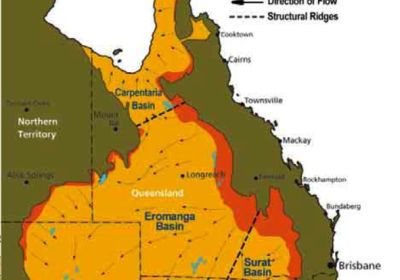 The Great Artesian Basin is one of the world’s largest underground water reservoirs. It is the only source of water for towns and farms across almost a quarter of Australia, from far north Queensland to northern South Australia. On November 7, the NSW Great Artesian Basin Advisory Group received a scientific report commissioned by the Artesian Bore Water Users Association (ABWUA). The report found that the reservoir’s recharge area is about a third as large as previously thought — covering less than 10% of the basin’s 1.7 million square kilometres.
The Great Artesian Basin is one of the world’s largest underground water reservoirs. It is the only source of water for towns and farms across almost a quarter of Australia, from far north Queensland to northern South Australia. On November 7, the NSW Great Artesian Basin Advisory Group received a scientific report commissioned by the Artesian Bore Water Users Association (ABWUA). The report found that the reservoir’s recharge area is about a third as large as previously thought — covering less than 10% of the basin’s 1.7 million square kilometres. -
 Fifty protesters, and a larger-than life Nemo, protested outside Westpac's Sydney office on November 9. Organised by Australian Youth Climate Coalition (AYCC), the protesters handed more than 15,000 postcards to the bank calling on it not to fund the massive coalmining expansion at Galilee Basin, which would lead to the Great Barrier Reef being dredged to facilitate coal transport. The reef was put on the World Heritage List in 1981.
Fifty protesters, and a larger-than life Nemo, protested outside Westpac's Sydney office on November 9. Organised by Australian Youth Climate Coalition (AYCC), the protesters handed more than 15,000 postcards to the bank calling on it not to fund the massive coalmining expansion at Galilee Basin, which would lead to the Great Barrier Reef being dredged to facilitate coal transport. The reef was put on the World Heritage List in 1981. -
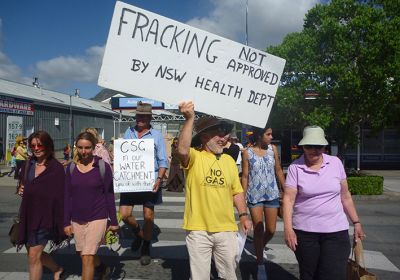 The Wilderness Sociey put out this media release on November 13. * * * The NSW government’s new policy to offer compensation for those affected by the coal seam gas industry is just a desperate attempt to try to buy support for the toxic industry, the Wilderness Society said today as the government finally released the policy days after leaking it to the media.
The Wilderness Sociey put out this media release on November 13. * * * The NSW government’s new policy to offer compensation for those affected by the coal seam gas industry is just a desperate attempt to try to buy support for the toxic industry, the Wilderness Society said today as the government finally released the policy days after leaking it to the media. -
Delegates from environmental groups from around the world gathered on the Venezuelan island of Margarita this month as part of the country's “Social Precop”. The event was coordinated by the Venezuelan government in a bid to take the “voice of the people” into the United Nations talks on climate change scheduled for December in Peru. Over several days, movements and activists put the final touches to the “Margarita Declaration” that was drafted in July after four days of debate and discussion.
-
 The controversial Sivens dam project in south-west France has been temporarily suspended after the death of 21-year-old activist Remi Fraisse while protesting at the site on October 25. An autopsy found that Fraisse had likely died from a police stun grenade that hit him in the back. Protests erupted across France in the immediate aftermath of the incident.
The controversial Sivens dam project in south-west France has been temporarily suspended after the death of 21-year-old activist Remi Fraisse while protesting at the site on October 25. An autopsy found that Fraisse had likely died from a police stun grenade that hit him in the back. Protests erupted across France in the immediate aftermath of the incident. -
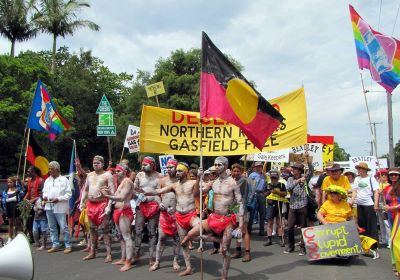 About 8000 people from across NSW’s Northern Rivers region gathered in Lismore on November 1 for a rally to declare the region gasfield free. Protesters marched through Lismore CBD to demand the government cancel all petroleum licences in the region. It then officially launched four large signs at each of the roads leading into the region, proclaiming: "Gasfield Free Northern Rivers – protected by community.” Organiser Elly Bird said: "This community is saying loud and clear that they want full cancellation of the licenses across the region, and nothing less will serve.
About 8000 people from across NSW’s Northern Rivers region gathered in Lismore on November 1 for a rally to declare the region gasfield free. Protesters marched through Lismore CBD to demand the government cancel all petroleum licences in the region. It then officially launched four large signs at each of the roads leading into the region, proclaiming: "Gasfield Free Northern Rivers – protected by community.” Organiser Elly Bird said: "This community is saying loud and clear that they want full cancellation of the licenses across the region, and nothing less will serve. -
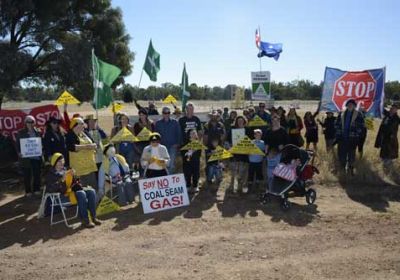 Almost 300 people gathered near Ipswich in Queensland for The Sunrise Project's Beyond Coal and Gas conference from October 24 to 27. The event featured more than 100 workshops and drew people from all states and territories as well as international visitors. There was a huge diversity of people and organisations including campaigners, activists, researchers, traditional owners and youth.
Almost 300 people gathered near Ipswich in Queensland for The Sunrise Project's Beyond Coal and Gas conference from October 24 to 27. The event featured more than 100 workshops and drew people from all states and territories as well as international visitors. There was a huge diversity of people and organisations including campaigners, activists, researchers, traditional owners and youth. -
This statement was released on November 6 by Sean Broklehurst, the Socialist Alliance candidate for Pascoe Vale in the November 29 Victorian elections, and Sarah Hathway, the Socialist Alliance candidate for Geelong. It refers to the project, set to cost at least $15 billion, to link Melbourne’s Eastern Freeway and City Link, with the major part of the project being a 4.4 kilometre tunnel. ***